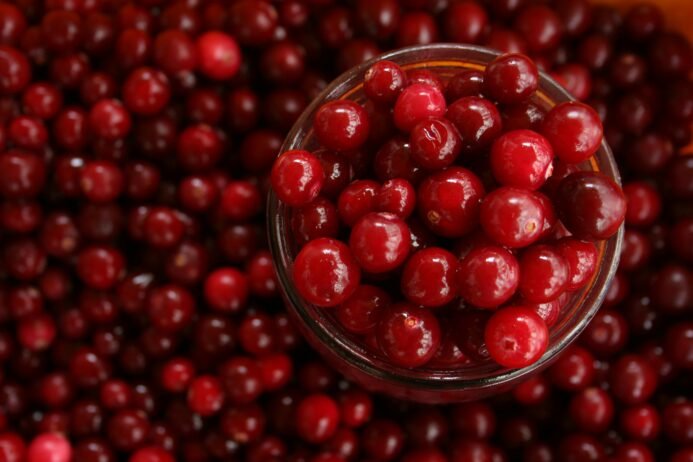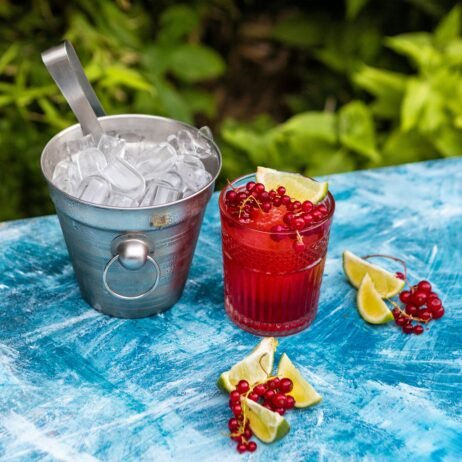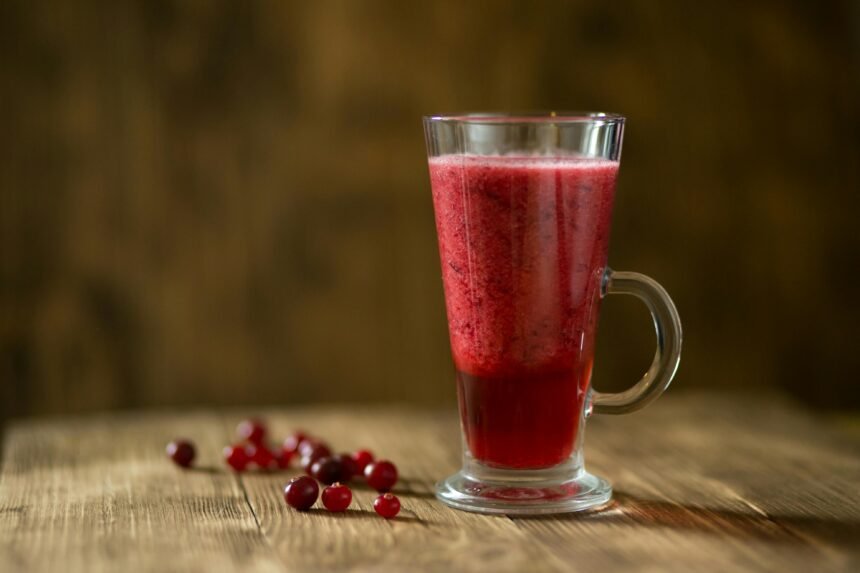Cranberry juice, known for its tart flavor and vibrant red color, is often praised for its potential health benefits, particularly for urinary tract health. But can it also improve heart health? Emerging research suggests that cranberry juice may offer cardiovascular benefits due to its rich antioxidant content, but there are risks to consider, especially with added sugars in commercial products. This article explores the potential heart health benefits of cranberry juice, its risks, and practical tips for incorporating it into a heart-healthy diet.
Nutritional Profile of Cranberry Juice


Cranberry juice is derived from cranberries, which are packed with nutrients and bioactive compounds. A typical 8-ounce (240 ml) serving of unsweetened, 100% pure cranberry juice contains:
- Calories: ~116 kcal
- Vitamin C: 23–26 mg (25–30% of the Daily Value), an antioxidant supporting blood vessel health
- Polyphenols: Including anthocyanins, proanthocyanidins, and flavonoids, which combat oxidative stress
- Potassium: ~195 mg, aiding blood pressure regulation
- Carbohydrates: ~31 grams, primarily natural sugars (unless sweetened)
- Fiber: Minimal (most is lost during juicing)
Commercial cranberry juices or “cocktails” often contain added sugars or blends with other fruit juices, reducing nutrient density and increasing calorie content. For heart health, opt for unsweetened, 100% cranberry juice or dilute blends to minimize sugar intake.
Potential Heart Health Benefits of Cranberry Juice
Cranberry juice’s bioactive compounds may support cardiovascular health through several mechanisms. Here’s what research suggests:


1. Reduces Oxidative Stress and Inflammation
- Mechanism: Cranberries are rich in antioxidants like anthocyanins and flavonoids, which neutralize free radicals that damage blood vessels and contribute to atherosclerosis (artery hardening). These compounds also lower inflammatory markers like C-reactive protein (CRP), linked to heart disease.
- Evidence: A 2011 study in Nutrition Research found that drinking 240 ml of cranberry juice daily for 8 weeks reduced oxidative stress markers in adults with metabolic syndrome, a condition tied to higher heart disease risk.
2. Improves Cholesterol Profiles
- Mechanism: Polyphenols in cranberry juice may increase HDL (“good”) cholesterol and reduce LDL (“bad”) cholesterol oxidation, preventing plaque buildup in arteries.
- Evidence: A 2015 study in The Journal of Nutrition showed that consuming 500 ml of low-calorie cranberry juice daily for 4 weeks increased HDL cholesterol by 8% and reduced oxidized LDL in overweight adults.
3. Supports Blood Vessel Function
- Mechanism: Cranberry juice’s antioxidants improve endothelial function (the ability of blood vessels to dilate), enhancing blood flow and reducing blood pressure. Proanthocyanidins may also prevent platelet aggregation, lowering the risk of blood clots.
- Evidence: A 2019 study in Food & Function found that drinking 450 ml of cranberry juice daily for 4 weeks improved flow-mediated dilation (a measure of blood vessel health) in men with coronary artery disease risk factors.


4. May Lower Blood Pressure
- Mechanism: The potassium in cranberry juice helps balance sodium levels, relaxing blood vessels. Polyphenols may also enhance nitric oxide production, further supporting blood vessel relaxation.
- Evidence: A 2012 study in Journal of Agricultural and Food Chemistry reported that cranberry juice consumption (400 ml daily for 8 weeks) modestly lowered systolic blood pressure in adults with elevated readings.
5. Reduces Cardiovascular Risk Factors
- Mechanism: By addressing oxidative stress, cholesterol, blood vessel function, and blood pressure, cranberry juice may lower the overall risk of heart disease, especially in those with risk factors like obesity or diabetes.
- Evidence: A 2020 review in Phytotherapy Research concluded that cranberry products (including juice) reduced cardiovascular risk markers, particularly in individuals with type 2 diabetes or metabolic syndrome.
Risks and Considerations of Cranberry Juice
While cranberry juice offers potential benefits, there are risks to consider, especially with improper consumption:
1. High Sugar Content in Commercial Juices
Many cranberry juice “cocktails” contain added sugars or high-fructose corn syrup, which can increase blood sugar, promote weight gain, and negate heart health benefits. Excess sugar is linked to higher triglyceride levels and heart disease risk.
Solution: Choose unsweetened, 100% cranberry juice or dilute blends with water. Check labels for “no added sugars.”
2. Medication Interactions
Cranberry juice may interact with blood thinners like warfarin due to its vitamin K content (minimal but present) or effects on liver enzymes. This could alter medication efficacy.
Solution: Consult your doctor if you take blood thinners or other heart medications before adding cranberry juice to your diet.
3. Acid Reflux and Digestive Issues
Cranberry juice’s acidity may trigger heartburn or acid reflux in sensitive individuals. Overconsumption can also cause stomach upset or diarrhea.
Solution: Limit intake to 4–8 ounces daily and pair with food to reduce irritation.
4. Calorie Overload
Even unsweetened cranberry juice is calorie-dense compared to whole fruits. Excessive consumption may contribute to weight gain, a heart disease risk factor.
Solution: Stick to moderate portions (4–8 ounces daily) and prioritize whole cranberries for higher fiber content.
5. Allergies or Sensitivities
Rare allergic reactions to cranberries (e.g., itching, swelling) can occur. Those with a history of kidney stones should consult a doctor, as cranberries contain oxalates, which may increase stone risk in susceptible individuals.
How Much Cranberry Juice Should You Drink?
Research suggests 4–8 ounces (120–240 ml) of unsweetened cranberry juice daily provides heart health benefits without excessive calories or sugar. For comparison:
- 4 ounces delivers ~50–60 calories and sufficient antioxidants.
- 8 ounces provides a higher dose but may increase sugar intake if not unsweetened.
Diluting with water (e.g., 1:1 ratio) or mixing with sparkling water can reduce calories while maintaining benefits. Alternatively, eating whole cranberries offers similar benefits with added fiber.
Practical Ways to Incorporate Cranberry Juice
Here are heart-healthy ways to add cranberry juice to your diet:
- Morning Boost: Mix 4 ounces of unsweetened cranberry juice with water or sparkling water for a refreshing drink.
- Smoothies: Blend 4 ounces of cranberry juice with berries, spinach, and a banana for a nutrient-packed smoothie.
- Salad Dressing: Combine cranberry juice with olive oil, balsamic vinegar, and herbs for a heart-healthy dressing.
- Mocktails: Create a low-sugar spritzer with cranberry juice, lime, and sparkling water.
- Sauces: Use cranberry juice as a base for sauces to pair with lean proteins like turkey or chicken.
Complementary Heart-Healthy Habits
To maximize cranberry juice’s benefits, adopt these lifestyle practices:
- Follow a Heart-Healthy Diet: Emphasize whole grains, fruits, vegetables, lean proteins, and healthy fats (e.g., avocados, nuts).
- Exercise Regularly: Aim for 150 minutes of moderate aerobic activity (e.g., brisk walking) weekly.
- Limit Sodium and Sugars: Keep sodium below 2,300 mg/day and avoid sugary drinks.
- Quit Smoking: Smoking damages blood vessels and counteracts cranberry juice’s benefits.
- Manage Stress: Practice mindfulness or yoga to reduce stress-related heart strain.
Conclusion
Cranberry juice, particularly unsweetened varieties, may improve heart health by reducing oxidative stress, improving cholesterol levels, supporting blood vessel function, and modestly lowering blood pressure. Its antioxidants, like anthocyanins and flavonoids, offer promising cardiovascular benefits, especially for those with risk factors like diabetes or obesity. However, risks like added sugars, medication interactions, and digestive issues require careful consideration. Stick to 4–8 ounces daily, choose unsweetened options, and consult your doctor if you have medical conditions or take medications. Combined with a balanced diet and healthy lifestyle, cranberry juice can be a flavorful addition to a heart-protective regimen.


